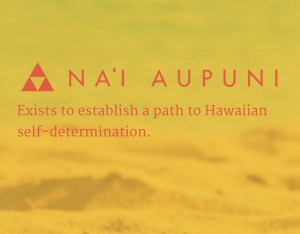Naʻi Aupuni Seeks Broader Group to Ratify Native Hawaiian Constitution

Image source: naiaupuni.org.
Naʻi Aupuni announced yesterday that it would not conduct a ratification vote on the proposed Native Hawaiian constitution produced during last month’s ‘aha (convention), but recommends utilizing the convention’s participants to further the vote.
As a result of the convention, a Native Hawaiian constitution was adopted Feb. 27 with a 88-30 vote.
“The constitution, drafted over several weeks, laborious committee meetings and intense floor debate, addresses everything from a core government structure to native rights,” a press release said.
Naʻi Aupuni is a private, nonprofit, independent organization made up of a volunteer board of directors from the Hawaiian community and supported through funds from the state Office of Hawaiian Affairs.
Naʻi Aupuni believes that the convention participants, who represent a diverse and multigenerational cross section of the Native Hawaiian leaders from Hawai‘i, the North American continent, Asia and Europe, or a similarly broad-based group, would be the best entity to advance the ratification vote and conduct the process of educating communities about the constitution.
“Na‘i Aupuni is appreciative of the participants who utilized the strength of our rich culture, the knowledge from our kūpuna and the collective wisdom of the ‘aha to significantly advance Native Hawaiian unity,” Na‘i Aupuni President Kuhio Asam said in a press release.
“Na‘i Aupuni believes that it is the participants, those who prepared and voted on the document, that are best able to lead efforts in effectively sharing the proposed constitution with the community and ultimately arranging for a ratification process,” said Asam “The participants have evidenced a remarkable willingness and ability to identify leadership, build critical teams and respectfully support the voices of many divergent opinions. It is for these reasons that we are deferring to the ‘aha participants to further advance their work.”
Asam said that although the stated objectives of Naʻi Aupuni were to conduct an election, an ʻaha and a ratification vote, the overarching goals were to provide an opportunity for Native Hawaiian leaders to exercise their inherent right to self-determination, to discuss self-governance options and, if they so decided, to develop a constitution that would unify and best serve the current and anticipated needs of Native Hawaiians.
Asam also said that although there were many hurdles along the path to the ‘aha, it produced more than a constitution.
“The ‘aha generated a long overdue and significant dialogue among the participants and within the larger community,” said Asam. “It is crucial that this conversation continues. The ‘aha also allowed leaders from the community to emerge and created momentum for further educating the public about self-governance, the proposed constitution and nation building.”
Bill Meheula, legal counsel for Naʻi Aupuni, reviewed the actions taken along the way due to legal challenges.
“From the beginning, we anticipated potential legal challenges and we currently continue to defend against the grassroot lawsuit that is now before the Ninth Circuit Court of Appeals,” Meheula said. “In addition, now that we cancelled the election and will not be conducting any ratification vote, Na‘i Aupuni contends that the appeal is moot and we are hopeful that the case will be eventually dismissed.”
Meheula also said that the estimated remaining grant funds of a little over $100,000, allocated to cover the cost of the ratification vote, would be returned to the Office of Hawaiian Affairs. Na‘i Aupuni also plans to publicly publish an accounting of how the funds were spent.
Information on Naʻi Aupuni can be found at naiaupuni.org.





_1768613517521.webp)


